XPG/Adata Unveils MARS 980 PCIe Gen5 Up to 4TB M.2 SSD Series
Including MARS 980 STORM with heat conduction via copper heat pipes, and active airflow from dual integrated fans, MARS 980 BLADE, and MARS 980 PRO featuring aluminum alloy heatsink combined with active fan
This is a Press Release edited by StorageNewsletter.com on April 30, 2025 at 2:01 pmXPG, gaming brand of Adata Technology Co. Ltd., has announced the launch of its latest high-performance PCIe Gen5 SSD series- the MARS 980.
MARS 980 STORM, MARS 980 BLADE, and MARS 980 PRO SSDs models
 Engineered specifically for professional gamers, tech enthusiasts, and overclocking specialists, the new series meets the soaring demands of artificial intelligence applications and high-performance computing. Featuring performance speeds of up to 14,000MB/s and utilizing an advanced 6nm process controller, the MARS 980 enhances both performance and power efficiency. Furthermore, it introduces an industry’s first-ever hybrid liquid-and-air cooling solution, effectively addressing the heat challenges posed by high-speed PCIe Gen5 SSD operations.
Engineered specifically for professional gamers, tech enthusiasts, and overclocking specialists, the new series meets the soaring demands of artificial intelligence applications and high-performance computing. Featuring performance speeds of up to 14,000MB/s and utilizing an advanced 6nm process controller, the MARS 980 enhances both performance and power efficiency. Furthermore, it introduces an industry’s first-ever hybrid liquid-and-air cooling solution, effectively addressing the heat challenges posed by high-speed PCIe Gen5 SSD operations.
The MARS 980 SSD lineup comprises 3 distinctive models – MARS 980 STORM, MARS 980 BLADE, and MARS 980 PRO – each optimized for various user needs and scenarios, fully supporting AI-driven creative workflows, data-intensive tasks, and high-speed operations. Undoubtedly, the MARS 980 series positions itself as the most compelling choice in the Gen5 SSD market.
MARS 980 STORM – Maximum Performance with Hybrid Cooling
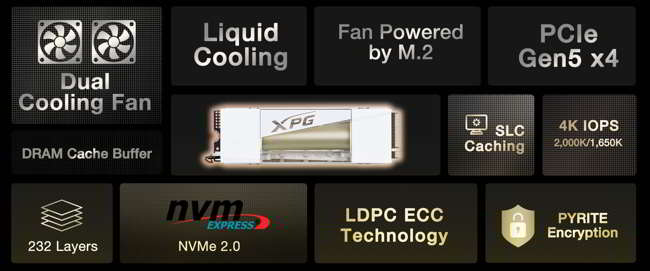 The MARS 980 STORM, utilizes the power of a PCIe Gen5 x4 interface, delivering sequential speeds of up to 14,000MB/s read and 13,000MB/s write. Uniquely, it is an industry’s first to adopt a patented design combining liquid and air cooling, along with a vertical, symmetrical dual-fan setup.
The MARS 980 STORM, utilizes the power of a PCIe Gen5 x4 interface, delivering sequential speeds of up to 14,000MB/s read and 13,000MB/s write. Uniquely, it is an industry’s first to adopt a patented design combining liquid and air cooling, along with a vertical, symmetrical dual-fan setup.
 By combining increased thermal capacity, efficient heat conduction via copper heat pipes, and active airflow from dual integrated fans, the innovative design dramatically reduces operating temperatures by approximately 20% [1] compared to traditional fanless heatsinks. Powered directly through the M.2 slot, the active cooling system requires no additional cables, simplifying installation and enhancing user convenience. With its 4TB storage capacity, the MARS 980 STORM caters not only to AI-driven computations and data analytics but also to professional gamers and content creators seeking the ultimate storage performance.
By combining increased thermal capacity, efficient heat conduction via copper heat pipes, and active airflow from dual integrated fans, the innovative design dramatically reduces operating temperatures by approximately 20% [1] compared to traditional fanless heatsinks. Powered directly through the M.2 slot, the active cooling system requires no additional cables, simplifying installation and enhancing user convenience. With its 4TB storage capacity, the MARS 980 STORM caters not only to AI-driven computations and data analytics but also to professional gamers and content creators seeking the ultimate storage performance.
MARS 980 BLADE – Cooling-Free Design, Laptop-Ready
Finally, laptops and compact mini PCs can also take full advantage of PCIe Gen5 SSD technology with the MARS 980 BLADE. Delivering sequential speeds of 14,000MB/s read and 13,000MB/s write via PCIe Gen5 x4, the MARS 980 BLADE uses a highly efficient 6nm controller to achieve remarkably low power consumption and superior thermal management. Its advanced design ensures consistent high performance without the need for additional cooling solutions, even when installed in tight spaces. Also available in capacities of up to 4TB, the MARS 980 BLADE can expand storage for PlayStation 5 consoles, providing unprecedented performance to mobile professionals and gamers alike.
MARS 980 PRO – Perfect Balance of Cooling and Performance
The MARS 980 PRO is designed for users seeking an optimal balance between high performance and value. Equipped with the PCIe Gen5 x4 interface, it achieves sequential speeds of up to 14,000MB/s read and 13,000MB/s write. Featuring an aluminum alloy heatsink combined with an active fan, this cooling solution efficiently dissipates heat generated during high-speed operations, reducing temperatures by 15% (1) compared to standard fanless solutions.
Like the STORM, it draws power directly from the M.2 slot, eliminating the need for additional cables and maintaining a streamlined setup. Additionally, the MARS 980 PRO, offering up to 4TB of storage, is optimized for gaming consoles such as the PlayStation 5, enabling users to upgrade their gaming experience with faster speeds and expanded storage.
[1] The thermal performance data is derived from internal laboratory testing under specific conditions. Actual results may vary due to differences in hardware configurations, software environments, and testing setups.








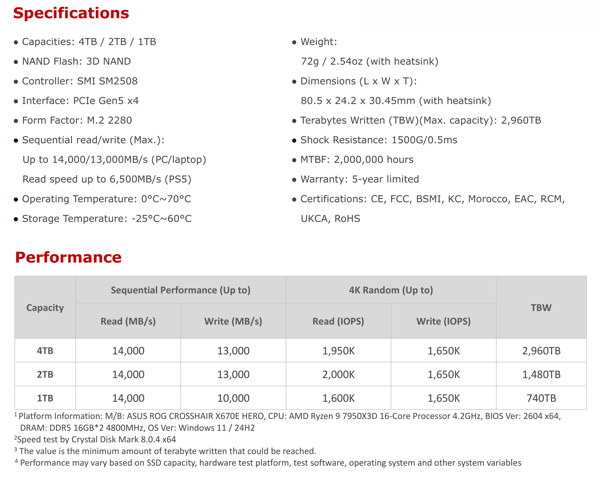
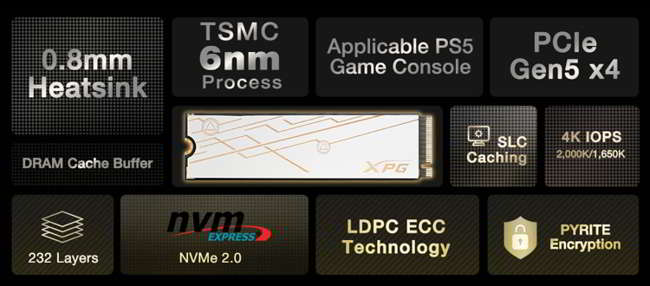
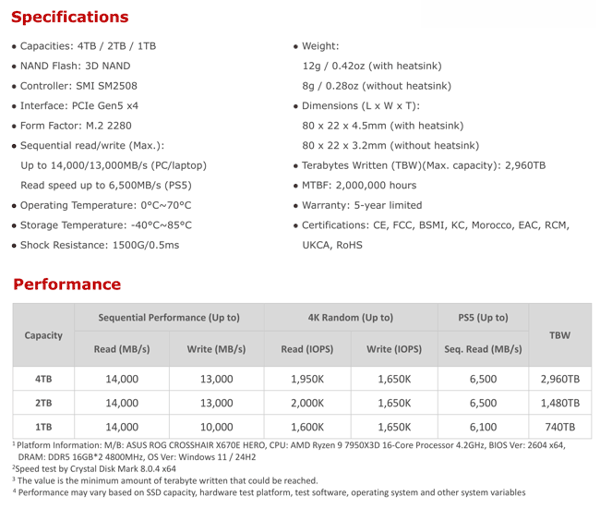
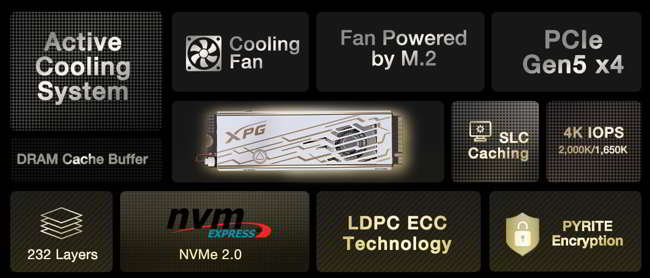
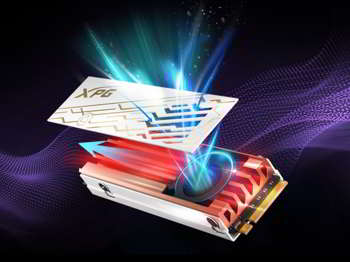
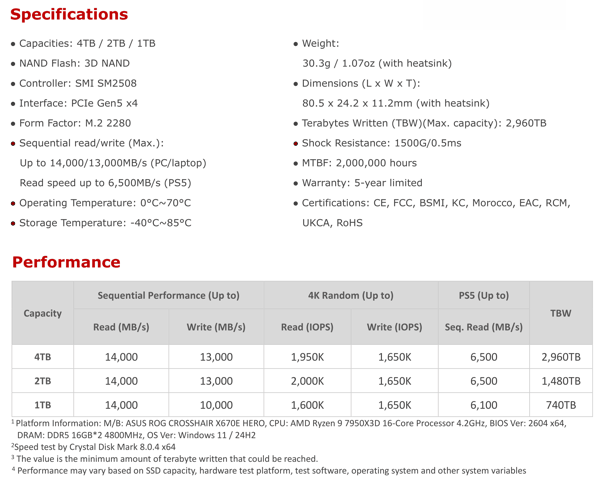






 Subscribe to our free daily newsletter
Subscribe to our free daily newsletter

